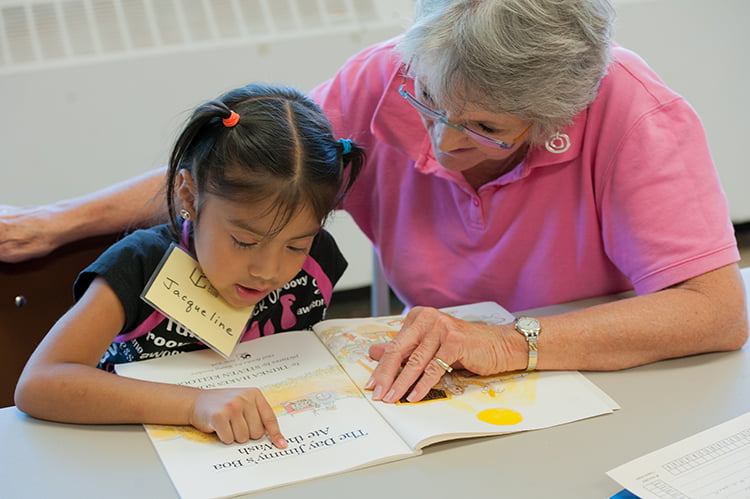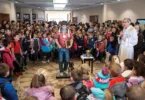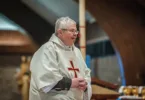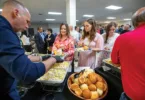
Mary Zeller, a member of Guardian Angels Parish in Kansas City, Mo., helps Jacqueline Gutierrez, 6, with reading at The Learning Club. The Learning Club offers students in the poorest part of the city tutoring and a consistent support system.
After being beaten by a group of kids, Brad Grabs fought back by offering hope to kids in KCK’s poorest areas.
by Katie Hyde
katie.hyde.theleaven@gmail.com
KANSAS CITY, Kan. —
“There was no option for kids.”
Most people would not devote their lives to the poor after being mugged and beaten in their own neighborhood. But then again, most people aren’t Brad Grabs.
One Sunday in 2000, Grabs was walking home from Mass in broad daylight when he was approached by two 15-year-olds who demanded he empty his pockets. When he told them he had no money, they grabbed him and began beating him, throwing punches to his face and stomach.
Beaten, but not badly hurt, Grabs managed to struggle free of the boys and sprint away.
He had always believed that children were inherently good. He was a volunteer at heart, having spent a year working with the Vincentian Service Corps in Arkansas and 10 years living at Shalom House, a home for homeless men in Kansas City, Kan.
But his faith was shaken: If these boys were good, then why had they attacked him?
The anger and fear lasted for months.
Then, something changed.
He realized that the boys had mugged him not because they lacked goodness, but because they lacked opportunity. Kids in Grabs’ neighborhood in Wyandotte County are some of the poorest in Kansas. Perhaps, Grabs thought, the boys had mugged him not because they were bad, but because they had lost hope.
“When it is easy for kids to make bad decisions, they go that route,” Grabs said. “There was no option for kids in this neighborhood.”
It takes a village to raise a child
From Grabs’ initial fear and anger after the mugging grew the idea for The Learning Club, a safety net education program for some of Kansas City’s poorest students. Grabs wanted to create a free, educational, after-school program for first- through eighth-graders of his neighborhood near the intersection of 18th Street and Parallel Parkway in Wyandotte County. After living in the area for years, he knew intimately the struggles of his community.
Poverty rates in the county were nearly 22 percent in 2010, making it the poorest county in Kansas. The rate increased steadily for years, then shot up by five percent between 2000 and 2010 following the economic recession of the late 2000s.
More than one in five people in the county live in poverty, or nearly 34,500 people. Many of them are children, for whom poverty is most severe. Many students at The Learning Club are behind in reading and writing and lack the resources to afford tutoring. Some students lack a support system at home, and turn to drugs, alcohol, and gangs.
Grabs — armed with compassion, a deep knowledge of his neighborhood, and a background in teaching — got to work.
From humble beginnings as a small-scale afterschool education program, the Learning Club has expanded to three locations and offers afterschool and summer learning on weekdays, a leadership academy for inner-city teenagers, and a program for teens at risk of dropping out of school, abusing drugs and alcohol, or joining gangs.
Because the neighborhood is in one of the poorest areas in the state, The Learning Club offers many things children don’t get at school or at home — a healthy snack, an hour of personal attention and tutoring, and a consistent support system.
A day in the life
Every day at The Learning Club begins the same.
“OK, kids, it’s time to be silent and focus,” Grabs says, and 25 students in a single-file line go silent.
“Take a deep breath.”
Twenty-five deep breaths are taken, slowly.
Inhale. Exhale.
Focus.
“Stand straight and tall.”
Twenty-five bodies come to attention.
Inhale. Exhale.
Focus.
A bell rings out, and the kids know it’s time to learn.
For the next hour, the kids work in near silence in math and reading workbooks, and the only sound heard in the room is the quick scribbling of pencils and the quiet melody of classic music played over the speakers.
This is what a typical day looks like at The Learning Club at Blessed Sacrament in Kansas City, Kan., one of the three locations where the club meets.
Grabs and Ken Gates, who also works for The Learning Club, quietly call students to another classroom for individual tutoring, while young adult volunteers monitor progress and keep the students focused.
One volunteer is Dominique Dirks, a 20-year-old University of Missouri-Kansas City student and resident of the neighborhood. Dirks, who has been coming to The Learning Club since third grade — first as a student, now as a volunteer — has deep ties to the club.
“Before The Learning Club, there was nothing to do after school,” Dirks said. “Now we have this.”
The Learning Club encouraged Dirks to continue in school, to challenge herself, and eventually to continue on to college, where she is now studying communications.
“I want to change this community and make it better,” she said. “And I have my little sister looking up to me.”
Reaching out to the margins
After seeing consistent progress in students at Blessed Sacrament, Grabs was ready to reach out further, to the most marginalized of Kansas City children.
He decided to visit Juniper Gardens, Kansas’ largest public housing project, where the average annual income is under $7,000. According to Grabs, the children here are Kansas’ most marginalized, barely scraping by on incomes less than one third of the federal poverty level.
Grabs first came to Juniper Gardens on a police ride-along years ago, when there was a domestic disturbance in the area. But before he arrived at the house, the police officer pulled over and turned off the car.
“We never go here alone,” the officer explained to Grabs. “It’s too dangerous.”
The officer waited for two more police officers to arrive, and they all entered together.
From the window of the police cruiser, Grabs saw young children playing outside.
“If police are too afraid to go in there alone, but kids are growing up there — well, that does not reflect well on us,” said Grabs.
So he brought The Learning Club to them, setting up shop in the community center there.
The children here face many more struggles than the average child, according to site director Franchiel Nyakatura. Nyakatura volunteered at The Learning Club for a year before being hired on as a coordinator and director for the club at Juniper Gardens.
“There are so many things that these kids face,” said Nyakatura. “Sometimes I can’t even imagine the things people live with.”
Like the student with seven brothers and sisters who always comes in hungry, or the girl who went months without eyeglasses because her family couldn’t afford them.
Grabs recalls two very bright and sweet sisters from Juniper Gardens who were in his class.
They were always on time and never missed a class.
And then they stopped coming.
So Grabs decided to visit their apartment.
Their mother answered the door.
“I don’t think the girls can come [to The Learning Club],” she said. “We’ve got to get out of here.”
As she opened the door wider, Grabs saw an enormous gash along her neck from where a neighbor had slashed her with a broken bottle.
A week later, the girls and their mother were gone, and Grabs never saw them again.
“It just breaks my heart,” he said. “They have such incredible obstacles to overcome.”
Hope
Despite the ever-worsening statistics on urban poverty, Grabs remains optimistic.
“I am hopeful because the kids are always hopeful,” Grabs said. “If you look at the big picture, the future can look bleak. But if you look at individuals, I see hope. I’m very hopeful about individual outcomes.”
Nyakatura mirrors this hope.
“We as Christians, we as Catholics, we have a total responsibility to transform the city, to transform a community, and part of that means we have to look outside of ourselves and our needs, even if it’s just for one hour.”






